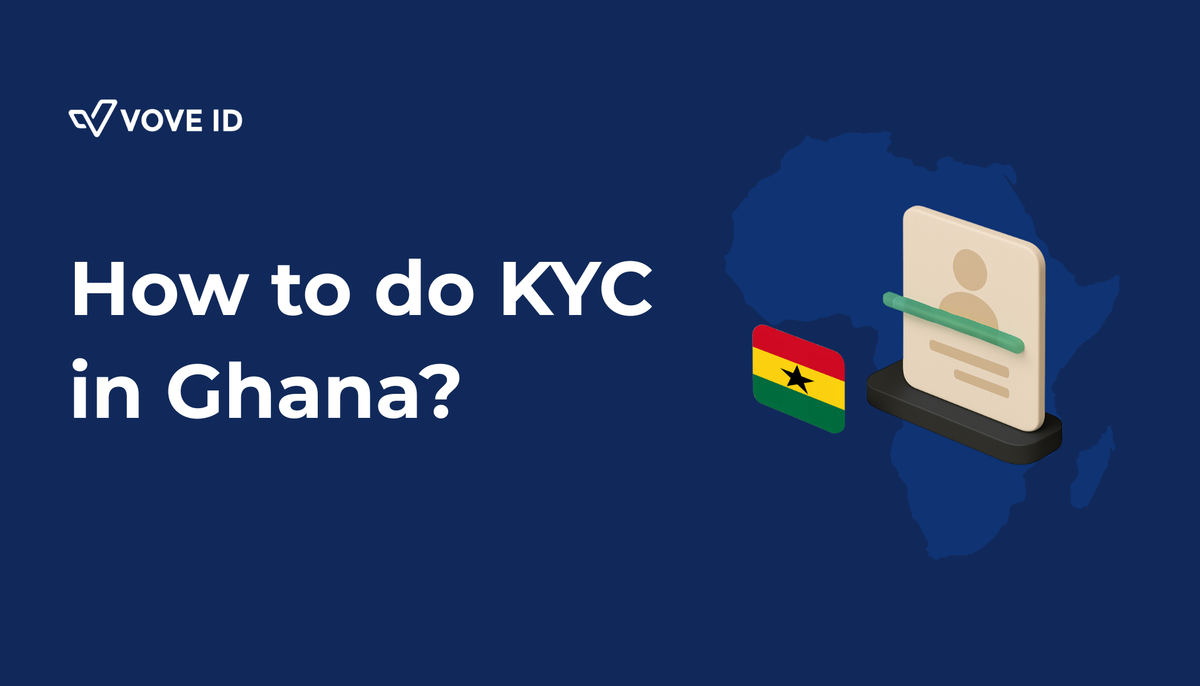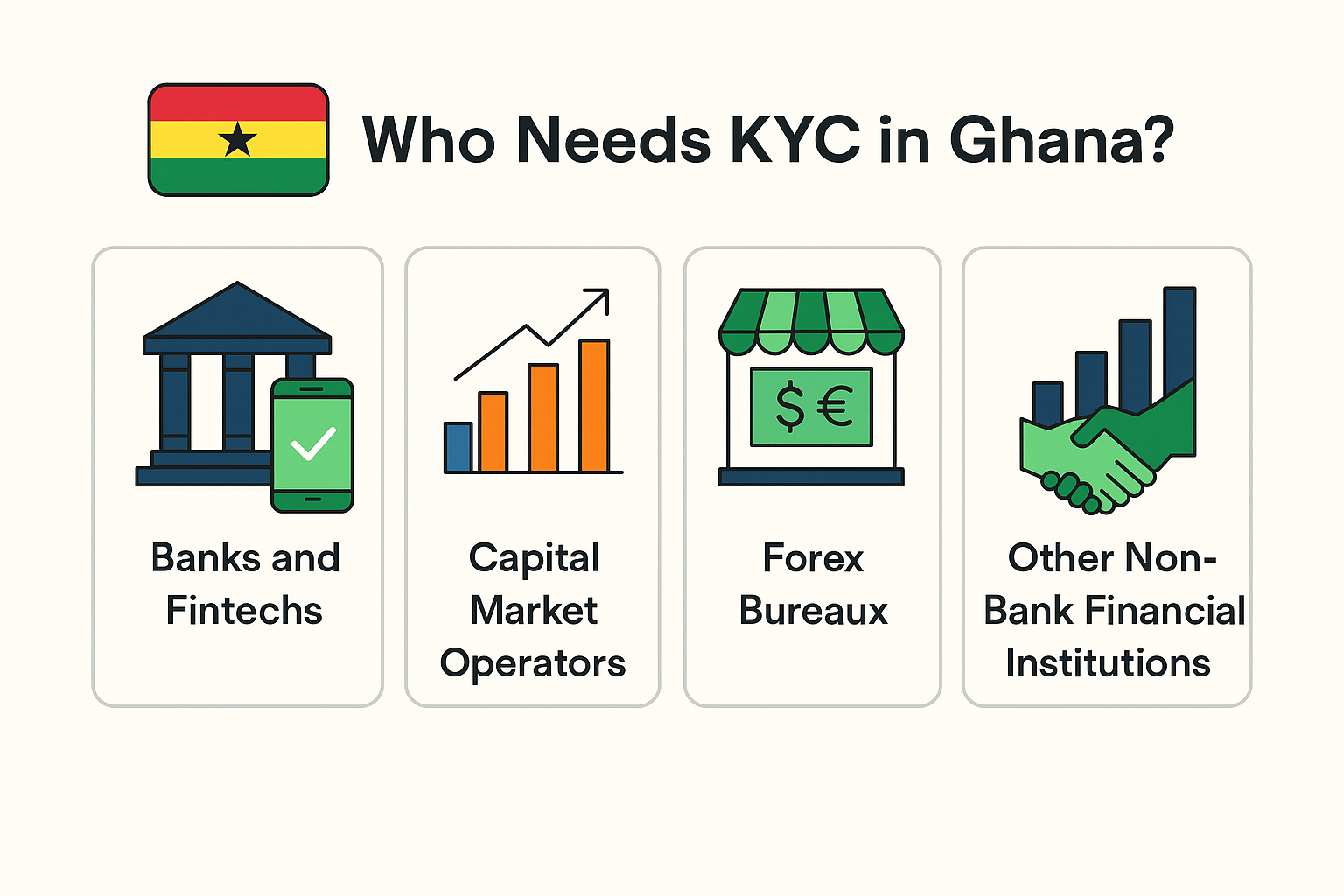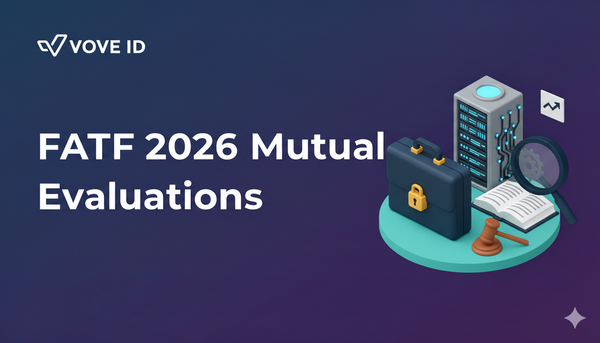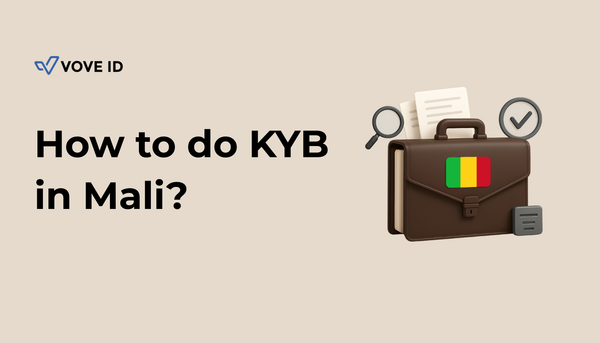KYC Compliance in Ghana 2025: Guide for Fintechs and Regulated Businesses

Introduction
Know Your Customer (KYC) compliance is a critical pillar of Ghana’s efforts to combat financial crime and foster trust in its rapidly growing financial sector. With the Ghana Card driving digital identity adoption and the Bank of Ghana (BoG) tightening anti-money laundering (AML) and counter-terrorism financing (CFT) regulations, 2025 is a pivotal year for fintechs, banks, and capital market operators. This guide breaks down Ghana’s KYC requirements, regulatory updates, and practical solutions for compliance, empowering businesses to navigate the evolving landscape efficiently.
What is KYC?
KYC, or Know Your Customer, is a set of processes to verify the identity of customers, assess their risk profiles, and monitor their transactions to prevent financial crimes like money laundering and fraud. Unlike Know Your Business (KYB), which focuses on verifying corporate entities, KYC targets individual customers. For more on KYC compliance in West Africa, read our 2025 KYC Guide for Nigeria. In Ghana, KYC is mandatory for regulated entities such as banks, fintechs, forex bureaux, and capital market operators, ensuring compliance with global standards set by the Financial Action Task Force (FATF).
Regulatory Framework for KYC in Ghana
Ghana’s KYC regulations are shaped by the Bank of Ghana (BoG), the Securities and Exchange Commission (SEC), and the Financial Intelligence Centre (FIC). Key frameworks include:
- Bank of Ghana’s KYC Policy: Aligns with FATF’s risk-based approach, requiring identity verification, customer risk profiling, transaction monitoring, and periodic KYC updates. Businesses must maintain internal controls, staff training, and whistleblowing systems.
- Anti-Money Laundering Act 2020 (Act 1044): Mandates customer due diligence (CDD), enhanced due diligence (EDD) for high-risk customers like politically exposed persons (PEPs), and reporting of suspicious transactions (STRs) and large cash transactions (CTRs).
- Ghana Card Mandate: Since 2022, the Ghana Card, linked to the National Identity Register, is the sole acceptable ID for customer onboarding in regulated institutions, replacing voter cards and NHIS cards.
- SEC Directives: Capital market operators must use standardized KYC forms, capturing personal identification, source of funds, and risk classification.
Who Needs KYC in Ghana?
KYC compliance is mandatory for:
- Banks and Fintechs: Required to verify customer identities, assess risk, and monitor transactions.
- Capital Market Operators: Must comply with SEC’s standardized KYC forms and risk-based CDD.
- Forex Bureaux: Subject to BoG’s expanded 2025 directive, requiring robust KYC and internal controls.
- Other Non-Bank Financial Institutions: Including microfinance and mobile money providers, must align with AML/CFT standards.

Any business handling customer funds or operating in regulated sectors must implement KYC to avoid penalties and maintain operational licenses.
KYC Requirements and Process
The KYC process in Ghana involves:
- Identity Verification: Collect and verify the Ghana Card (or biometric passports for non-residents).
- Customer Risk Profiling: Classify customers as low, medium, or high risk, applying simplified due diligence (SDD) or enhanced due diligence (EDD) as needed.
- Transaction Monitoring: Detect and report unusual or suspicious activities to the FIC.
- Record-Keeping: Maintain accurate, up-to-date KYC records for at least six years.
- Sanctions and PEP Screening: Cross-check customers against global sanctions lists and PEP databases.
Challenges:
- Infrastructure Gaps: Limited access to Ghana Card services in rural areas.
- Technical Integration: Connecting to national databases requires investment in APIs and RegTech solutions.
- Regulatory Updates: Frequent changes demand constant vigilance to stay compliant.
Penalties for Non-Compliance
Non-compliance with Ghana’s KYC regulations carries severe consequences:
- Fines: Up to GHS 1 million for institutions failing to implement adequate KYC measures (AML Act 2020).
- License Revocation: BoG and SEC can suspend or revoke operating licenses.
- Reputational Damage: Non-compliance erodes customer trust and investor confidence.
- Criminal Liability: Individuals (e.g., compliance officers) may face prosecution for willful negligence.
In 2024, a Ghanaian fintech faced a GHS 500,000 fine for inadequate PEP screening, underscoring the need for robust KYC systems.
How to Simplify KYC Compliance
Navigating Ghana’s KYC landscape is complex, but technology can streamline compliance without compromising growth. Solutions like VOVE ID offer:
- Seamless Ghana Card Integration: Connects to the National Identity Register for real-time verification.
- AI-Powered Verification: Uses facial recognition and liveness detection to ensure secure onboarding.
- Sanctions and PEP Screening: Automates checks against global databases, reducing manual errors.
- Scalable APIs and SDKs: Simplifies integration for fintechs and banks, supporting mobile and web platforms.
By adopting automated KYC tools, businesses can reduce onboarding times, improve accuracy, and maintain audit-ready records, all while meeting BoG and SEC requirements.
Conclusion
KYC in Ghana is a cornerstone of financial transparency, safeguarding institutions from fraud and ensuring compliance with the AML Act 2020 and BoG directives. With the Ghana Card driving digital identity verification and regulators raising the bar on due diligence, staying compliant has never been more crucial. By adopting smart verification tools and staying ahead of regulatory changes, businesses can streamline onboarding, reduce risk, and build lasting trust.
Protect your business and simplify compliance—explore how VOVE ID’s KYC solutions are built for Ghana’s regulatory landscape. Visit our contact page to learn more!




